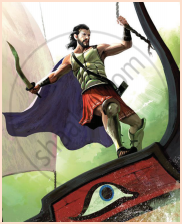Advertisements
Advertisements
प्रश्न
Read the line given below and answer the question that follow.
“Life is a soft loam; be gentle; go easy.” And this too might serve him.
- Why does the poet suggest to take life easy?
- Identify the figure of speech in the above line.
उत्तर
- There are certain occasions one needs to treat life-like wet clay very gently. Take life as it comes without hard resistance. The poet says, “Brutes have been gentled where lashes failed.”
- Metaphor
APPEARS IN
संबंधित प्रश्न
Have you ever visited a fort or a castle?
Who is the narrator in the poem?
Why were the soldiers in the castle fearless?
Why didn’t the narrator want to tell the tale to anybody?
How safe was the castle? How was it conquered?
Read the given line and answer the question that follow in a line or two.
A foothold there, no clever trick
Could take us dead or quick,
Only a bird could have got in.
- What was challenging?
- Which aspect of the castle’s strength is conveyed by the above line?
Read the given line and answer the question that follow in a line or two.
We could do nothing, being sold.
- Why couldn’t they do anything?
- Why did they feel helpless?
Our captain was brave and we were true
Identify the figure of speech used in the following line.
Oh then our maze of tunneled stone
What is the creeper compared to?
Why is the casuarina tree dear to poet’s heart?
Which stage of man’s life is associated with the ‘shrunk shank’?
Pick out the word in ‘alliteration’ in the following line.
“And one man in his time plays many parts”
Introduction
The poem ‘Ulysses’ is a dramatic monologue that contains 70 lines of blank verse. Ulysses, the King of Ithaca, gathers his men together to prepare for the journey and exhorts them not to waste their time left on earth. Ulysses has grown old, having experienced many adventures at the battle of Troy and in the seas. After returning to Ithaca, he desires to embark upon his next voyage. His inquisitive spirit is always looking forward to more and more of such adventures.

‘Ulysses is not happy to perform his duties as a king.’ Why?
‘As tho’ to breathe were life!’ – From the given line what do you understand of Ulysses’ attitude to life?
‘He works his work, I mine’ – How is the work distinguished?
Read the set of line from the poem and answer the question that follow.
Death closes all: but something ere the end,
Some work of noble note, may yet be done,
Not unbecoming men that strove with Gods.
- The above lines convey the undying spirit of Ulysses. Explain.
- Pick out the words in alliteration in the above lines.
Explain with reference to the context the following line.
To follow knowledge like a sinking star,
Beyond the utmost bound of human thought.
How would his being alone help the boy?
Here are a few poetic device used in the poem.
Repetition- It is a figure of speech.
Read the line given below and answer the question that follow.
..........Free imaginations
Bringing changes into a world resenting change.
- How does free imagination help the world?
- Identify the figure of speech.
Explain the following line with reference to the context.
Yet learning something out of every folly
hoping to repeat none of the cheap follies
Explain how the poet guides his son who is at the threshold of manhood, to face the challenges of life.
Describe the posture of Napoleon.
Where did the rider plant the French flag after Ratisbon was captured?
Literary Devices
Mark the rhyme scheme of the poem. The rhyme scheme for the first stanza is as follows.
| With neck out-thrust, you fancy how, | a |
| Legs wide, arms locked behind, | b |
| As if to balance the prone brow | a |
| Oppressive with its mind. | b |
What is the role of the young soldier in the victory of the French at Ratisbon?
